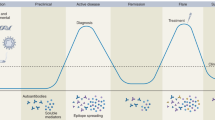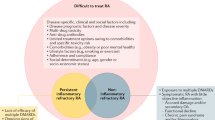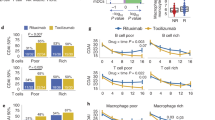Abstract
Despite the success of targeted therapies in the treatment of inflammatory arthritides, the lack of predictive biomarkers drives a ‘trial and error’ approach to treatment allocation, leading to variable and/or unsatisfactory responses. In-depth characterization of the synovial tissue in rheumatoid arthritis, as well as psoriatic arthritis and spondyloarthritis, is bringing new insights into the diverse cellular and molecular features of these diseases and their potential links with different clinical and treatment-response phenotypes. Such progress raises the tantalizing prospect of improving response rates by matching the use of specific agents to the cognate target pathways that might drive particular disease subtypes in specific patient groups. Innovative patient-centric, molecular pathology-driven clinical trial approaches are needed to achieve this goal. Whilst progress is clearly being made, it is important to emphasize that this field is still in its infancy and there are a number of potential barriers to realizing the premise of patient-centric clinical trials.
This is a preview of subscription content, access via your institution
Access options
Access Nature and 54 other Nature Portfolio journals
Get Nature+, our best-value online-access subscription
$29.99 / 30 days
cancel any time
Subscribe to this journal
Receive 12 print issues and online access
$209.00 per year
only $17.42 per issue
Buy this article
- Purchase on Springer Link
- Instant access to full article PDF
Prices may be subject to local taxes which are calculated during checkout




Similar content being viewed by others
References
Smolen, J. S., Aletaha, D. & Mcinnes, I. B. Rheumatoid arthritis. Lancet 388, 2023–2038 (2016).
Smolen, J. S. et al. Rheumatoid arthritis. Nat. Rev. Dis. Primers 4, 18001 (2018).
Nam, J. L. et al. Efficacy of biological disease-modifying antirheumatic drugs: a systematic literature review informing the 2016 update of the EULAR recommendations for the management of rheumatoid arthritis. Ann. Rheum. Dis. 76, 1113–1136 (2017).
Weinblatt, M. E. et al. Head-to-head comparison of subcutaneous abatacept versus adalimumab for rheumatoid arthritis: findings of a phase IIIb, multinational, prospective, randomized study. Arthritis Rheumatol. 65, 28–38 (2013).
Porter, D. et al. Tumour necrosis factor inhibition versus rituximab for patients with rheumatoid arthritis who require biological treatment (ORBIT): an open-label, randomised controlled, non-inferiority, trial. Lancet 388, 239–247 (2016).
Smolen, J. S. et al. Head-to-head comparison of certolizumab pegol versus adalimumab in rheumatoid arthritis: 2-year efficacy and safety results from the randomised EXXELERATE study. Lancet 388, 2763–2774 (2016).
Smolen, J. S. & Aletaha, D. Rheumatoid arthritis therapy reappraisal: strategies, opportunities and challenges. Nat. Rev. Rheumatol. 11, 276–289 (2015).
Buch, M. H., Bingham, S. J., Bryer, D. & Emery, P. Long-term infliximab treatment in rheumatoid arthritis: subsequent outcome of initial responders. Rheumatology 46, 1153–1156 (2007).
Tak, P. P. A personalized medicine approach to biologic treatment of rheumatoid arthritis: a preliminary treatment algorithm. Rheumatology 51, 600–609 (2012).
Lewis, M. J. et al. Molecular portraits of early rheumatoid arthritis identify clinical and treatment response phenotypes. Cell Rep. 28, 2455–2470.e5 (2019).
Humby, F. et al. Synovial cellular and molecular signatures stratify clinical response to csDMARD therapy and predict radiographic progression in early rheumatoid arthritis patients. Ann. Rheum. Dis. 78, 761–772 (2019).
Lliso-Ribera, G. et al. Synovial tissue signatures enhance clinical classification and prognostic/treatment response algorithms in early inflammatory arthritis and predict requirement for subsequent biological therapy: results from the pathobiology of early arthritis cohort (PEAC). Ann. Rheum. Dis. 78, 1642–1652 (2019).
WHO Scientific Group on the Burden of Musculoskeletal Conditions at the Start of the New Millennium. The burden of musculoskeletal conditions at the start of the new millennium. World Health Organ. Tech. Rep. Ser. 919, 1–218 (2003).
Goutsouliak, K. et al. Towards personalized treatment for early stage HER2-positive breast cancer. Nat. Rev. Clin. Oncol. 244, 707–718 (2019).
Le, D. T. et al. Mismatch repair deficiency predicts response of solid tumors to PD-1 blockade. Science 357, 409–413 (2017).
Smolen, J. S. et al. EULAR recommendations for the management of rheumatoid arthritis with synthetic and biological disease-modifying antirheumatic drugs: 2019 update. Ann. Rheum. Dis. 79, 685–699 (2020).
Cuppen, B. V. J. et al. Personalized biological treatment for rheumatoid arthritis: a systematic review with a focus on clinical applicability. Rheumatology 55, 826–839 (2016).
Taylor, P. C. et al. Clinical characteristics and patient-reported outcomes in patients with inadequately controlled rheumatoid arthritis despite ongoing treatment. RMD Open 4, e000615 (2018).
Studenic, P. et al. Testing different thresholds for patient global assessment in defining remission for rheumatoid arthritis: are the current ACR/EULAR Boolean criteria optimal? Ann. Rheum. Dis. 79, 445–452 (2020).
Michelsen, B. et al. Discordance between tender and swollen joint count as well as patient’s and evaluator’s global assessment may reduce likelihood of remission in patients with rheumatoid arthritis and psoriatic arthritis: data from the prospective multicentre NOR-DMARD study. Ann. Rheum. Dis. 76, 708–711 (2017).
Hensor, E. M. A. et al. Validity of a two-component imaging-derived disease activity score for improved assessment of synovitis in early rheumatoid arthritis. Rheumatology 58, 1400–1409 (2019).
Tanaka, Y. et al. Discontinuation of adalimumab after achieving remission in patients with established rheumatoid arthritis: 1-year outcome of the HONOR study. Ann. Rheum. Dis. 74, 389–395 (2015).
Keystone, E. C. et al. Toward defining primary and secondary nonresponse in rheumatoid arthritis patients treated with anti-TNF: results from the BioTRAC and OBRI registries. J. Rheumatol. 47, 510–517 (2020).
Alzabin, S. et al. Incomplete response of inflammatory arthritis to TNFα blockade is associated with the Th17 pathway. Ann. Rheum. Dis. 71, 1741–1748 (2012).
Strand, V. et al. Immunogenicity of biologics in chronic inflammatory diseases: a systematic review. BioDrugs 31, 299–316 (2017).
Buch, M. H. et al. The value of synovial cytokine expression in predicting the clinical response to TNF antagonist therapy (infliximab). Rheumatology 47, 1469–1475 (2008).
Kumar, K. et al. Determinants of adherence to disease modifying anti-rheumatic drugs in White British and South Asian patients with rheumatoid arthritis: a cross sectional study. BMC Musculoskelet. Disord. 16, 311–396 (2015).
Buch, M. H., Pavitt, S., Parmar, M. & Emery, P. Creative trial design in RA: optimizing patient outcomes. Nat. Rev. Rheumatol. 9, 183–194 (2013).
Pitzalis, C., Kelly, S. & Humby, F. New learnings on the pathophysiology of RA from synovial biopsies. Curr. Opin. Rheumatol. 25, 334–344 (2013).
Blanco, F. J. et al. Secukinumab in active rheumatoid arthritis: a phase III randomized, double-blind, active comparator- and placebo-controlled study. Arthritis Rheumatol. 69, 1144–1153 (2017).
Cañete, J. D. et al. Ectopic lymphoid neogenesis is strongly associated with activation of the IL-23 pathway in rheumatoid synovitis. Arthritis Res. Ther. 17, 173 (2015).
Fleischmann, R., Landewé, R. & Smolen, J. S. Review of head-to-head study designs in rheumatoid arthritis. Semin. Arthritis Rheum. 46, 279–285 (2016).
Vashisht, P., Sayles, H., Cannella, A. C., Mikuls, T. R. & Michaud, K. Generalizability of patients with rheumatoid arthritis in biologic agent clinical trials. Arthritis Care Res. 68, 1478–1488 (2016).
Park, J. J. H. et al. Systematic review of basket trials, umbrella trials, and platform trials: a landscape analysis of master protocols. Trials 20, 510–572 (2019).
Isaacs, J. D. et al. Effect of baseline rheumatoid factor and anticitrullinated peptide antibody serotype on rituximab clinical response: a meta-analysis. Ann. Rheum. Dis. 72, 329–336 (2013).
Gerlag, D. M. et al. Effects of B-cell directed therapy on the preclinical stage of rheumatoid arthritis: the PRAIRI study. Ann. Rheum. Dis. 78, 179–185 (2019).
Miyagawa, I. et al. Precision medicine using different biological DMARDs based on characteristic phenotypes of peripheral T helper cells in psoriatic arthritis. Rheumatology 58, 336–344 (2019).
Badot, V. et al. Gene expression profiling in the synovium identifies a predictive signature of absence of response to adalimumab therapy in rheumatoid arthritis. Arthritis Res. Ther. 11, R57 (2009).
De Groof, A. et al. Higher expression of TNFα-induced genes in the synovium of patients with early rheumatoid arthritis correlates with disease activity, and predicts absence of response to first line therapy. Arthritis Res. Ther. 18, 19 (2016).
Ducreux, J. et al. Global molecular effects of tocilizumab therapy in rheumatoid arthritis synovium. Arthritis Rheumatol. 66, 15–23 (2013).
Gutierrez-Roelens, I. et al. Rituximab treatment induces the expression of genes involved in healing processes in the rheumatoid arthritis synovium. Arthritis Rheumatol. 63, 1246–1254 (2011).
Hogan, V. E. et al. Pretreatment synovial transcriptional profile is associated with early and late clinical response in rheumatoid arthritis patients treated with rituximab. Ann. Rheum. Dis. 71, 1888–1894 (2012).
EU Clinical Trials Register. EudraCT number: 2014-003529-16. European Medicines Agency https://www.clinicaltrialsregister.eu/ctr-search/search?query=eudract_number:2014-003529-16 (2020).
EU Clinical Trials Register. ClinicalTrialsRegister.eu, EudraCT number: 2012-002535-28. European Medicines Agency https://www.clinicaltrialsregister.eu/ctr-search/search?query=eudract_number:2012-002535-28 (2020).
Kelly, S. et al. Ultrasound-guided synovial biopsy: a safe, well-tolerated and reliable technique for obtaining high-quality synovial tissue from both large and small joints in early arthritis patients. Ann. Rheum. Dis. 74, 611–617 (2015).
Just, S. A. et al. Patient-reported outcomes and safety in patients undergoing synovial biopsy: comparison of ultrasound-guided needle biopsy, ultrasound-guided portal and forceps and arthroscopic-guided synovial biopsy techniques in five centres across Europe. RMD Open 4, e000799 (2018).
Antoniou, M., Kolamunnage-Dona, R. & Jorgensen, A. L. Biomarker-guided non-adaptive trial designs in phase II and phase III: a methodological review. J. Pers. Med. 7, 1 (2017).
Antoniou, M., Jorgensen, A. L. & Kolamunnage-Dona, R. Biomarker-guided adaptive trial designs in phase II and phase III: a methodological review. PLoS ONE 11, e0149803 (2016).
Ulfgren, A. K. et al. Systemic anti-tumor necrosis factor alpha therapy in rheumatoid arthritis down-regulates synovial tumor necrosis factor alpha synthesis. Arthritis Rheum. 43, 2391–2396 (2000).
Dennis, G. et al. Synovial phenotypes in rheumatoid arthritis correlate with response to biologic therapeutics. Arthritis Res. Ther. 16, R90 (2014).
Biankin, A. V., Piantadosi, S. & Hollingsworth, S. J. Patient-centric trials for therapeutic development in precision oncology. Nature 526, 361–370 (2015).
Choy, E. H., Kavanaugh, A. F. & Jones, S. A. The problem of choice: current biologic agents and future prospects in RA. Nat. Rev. Rheumatol. 9, 154–163 (2013).
Ogata, A., Kato, Y., Higa, S. & Yoshizaki, K. IL-6 inhibitor for the treatment of rheumatoid arthritis: a comprehensive review. Mod. Rheumatol. 29, 258–267 (2019).
Sieper, J., Porter-Brown, B., Thompson, L., Harari, O. & Dougados, M. Assessment of short-term symptomatic efficacy of tocilizumab in ankylosing spondylitis: results of randomised, placebo-controlled trials. Ann. Rheum. Dis. 73, 95–100 (2014).
Wu, D. et al. Meta-analysis of IL-17 inhibitors in two populations of rheumatoid arthritis patients: biologic-naive or tumor necrosis factor inhibitor inadequate responders. Clin. Rheumatol. 365, 2205–2210 (2019).
Smolen, J. S. et al. A randomised phase II study evaluating the efficacy and safety of subcutaneously administered ustekinumab and guselkumab in patients with active rheumatoid arthritis despite treatment with methotrexate. Ann. Rheum. Dis. 76, 831–839 (2017).
Poddubnyy, D., Hermann, K.-G. A., Callhoff, J., Listing, J. & Sieper, J. Ustekinumab for the treatment of patients with active ankylosing spondylitis: results of a 28-week, prospective, open-label, proof-of-concept study (TOPAS). Ann. Rheum. Dis. 73, 817–823 (2014).
Deodhar, A. et al. Three multicenter, randomized, double-blind, placebo-controlled studies evaluating the efficacy and safety of ustekinumab in axial spondyloarthritis. Arthritis Rheumatol. 71, 258–270 (2019).
Baeten, D. et al. Risankizumab, an IL-23 inhibitor, for ankylosing spondylitis: results of a randomised, double-blind, placebo-controlled, proof-of-concept, dose-finding phase 2 study. Ann. Rheum. Dis. 77, 1295–1302 (2018).
Schett, G. & Firestein, G. S. Mr Outside and Mr Inside: classic and alternative views on the pathogenesis of rheumatoid arthritis. Ann. Rheum. Dis. 69, 787–789 (2010).
Merashli, M., De Marco, G., Podgorski, M., McGonagle, D. & Marzo-Ortega, H. Evidence of response to IL-6 inhibition in some cases of refractory spondyloarthritis-associated peripheral synovitis. Ann. Rheum. Dis. 75, 1418–1420 (2016).
U.S. Food and Drug Administration. Adaptive design clinical trials for drugs and biologics: guidance for industry. FDA https://www.fda.gov/media/78495/download (2019).
Antoniou, M. et al. Biomarker-guided trials: challenges in practice. Contemp. Clin. Trials Commun. 16, 100493 (2019).
Humby, F. et al. Use of ultrasound-guided small joint biopsy to evaluate the histopathologic response to rheumatoid arthritis therapy: recommendations for application to clinical trials. Arthritis Rheumatol. 67, 2601–2610 (2015).
Barton, A. & Pitzalis, C. Stratified medicine in rheumatoid arthritis-the MATURA programme. Rheumatology 56, 1247–1250 (2017).
Pickles, T. et al. Adaptive trial designs in rheumatology: report from the OMERACT Special Interest Group. J. Rheumatol. 46, 1406–1408 (2019).
Mandelin, A. M. et al. Transcriptional profiling of synovial macrophages using minimally invasive ultrasound-guided synovial biopsies in rheumatoid arthritis. Arthritis Rheumatol. 70, 841–854 (2018).
Donlin, L. T. et al. Methods for high-dimensonal analysis of cells dissociated from cyropreserved synovial tissue. Arthritis Res. Ther. 20, 139 (2018).
Zhang, F. et al. Defining inflammatory cell states in rheumatoid arthritis joint synovial tissues by integrating single-cell transcriptomics and mass cytometry. Nat. Immunol. 20, 928–942 (2019).
Mease, P. J. et al. The efficacy and safety of clazakizumab, an anti-interleukin-6 monoclonal antibody, in a phase IIb study of adults with active psoriatic arthritis. Arthritis Rheumatol. 68, 2163–2173 (2016).
Tahir, H. et al. Secukinumab in active rheumatoid arthritis after anti-TNFα therapy: a randomized, double-blind placebo-controlled phase 3 study. Rheumatol. Ther. 4, 475–488 (2017).
Author information
Authors and Affiliations
Contributions
C.P., E.H.S.C. and M.H.B. made substantial contributions to discussion of the content and researched data for the article; C.P. wrote the article and C.P., E.H.S.C. and M.H.B. reviewed and edited the manuscript before submission.
Corresponding author
Ethics declarations
Competing interests
The authors declare no competing interests.
Additional information
Peer review information
Nature Reviews Rheumatology thanks A. Jorgensen and the other, anonymous, reviewer(s) for their contribution to the peer review of this work.
Publisher’s note
Springer Nature remains neutral with regard to jurisdictional claims in published maps and institutional affiliations.
Rights and permissions
About this article
Cite this article
Pitzalis, C., Choy, E.H.S. & Buch, M.H. Transforming clinical trials in rheumatology: towards patient-centric precision medicine. Nat Rev Rheumatol 16, 590–599 (2020). https://doi.org/10.1038/s41584-020-0491-4
Accepted:
Published:
Issue Date:
DOI: https://doi.org/10.1038/s41584-020-0491-4
This article is cited by
-
Unlocking the power of precision medicine: exploring the role of biomarkers in cancer management
Future Journal of Pharmaceutical Sciences (2024)
-
Unveiling innovative therapeutic strategies and future trajectories on stimuli-responsive drug delivery systems for targeted treatment of breast carcinoma
Naunyn-Schmiedeberg's Archives of Pharmacology (2024)
-
Seven-chain adaptive immune receptor repertoire analysis in rheumatoid arthritis reveals novel features associated with disease and clinically relevant phenotypes
Genome Biology (2024)
-
Imaging in inflammatory arthritis: progress towards precision medicine
Nature Reviews Rheumatology (2023)
-
Precision medicine in systemic lupus erythematosus
Nature Reviews Rheumatology (2023)



